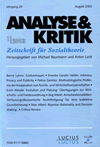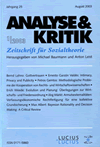The Relevance of Ideal Justice
 | 2011 (33) Issue 2 Guest-Editors: Lukas Meyer / Pranay Sanklecha Whether and how normative theorising can be relevant for guiding people’s actions is one of the classical questions of moral and political philosophy. Platon’s dialogues Politeia, Politikos and Nomoi provide fascinating discussions on the topic. Recently normative theorists have investigated some aspects of these questions under the title of ideal and non-ideal theorising—relying on a distinction that Rawls introduced in A Theory of Justice (1971) and made use of in his The Law of Peo |
Work and Cooperation
 | 2011 (33) Issue 1 Both in social theories with the aim of looking into the creative core of society as well as in everyday politics, two intuitions often supplement each other. The first intuition, empirico-analytical, views common organization of work and production as being the very aim of society, and other parts of society being explicable from this. A second intuition, ethical or moral, holds the sphere of work to be the central site for diagnoses of a society's inherent justice. Both intuitions not only con |